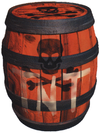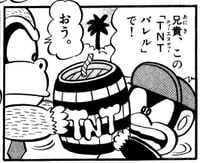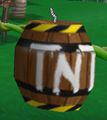TNT Barrel
| TNT Barrel | |
|---|---|
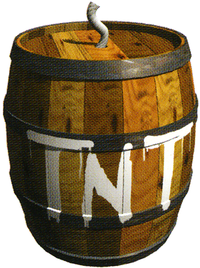 Artwork of a TNT Barrel from Donkey Kong Country | |
| First appearance | Donkey Kong Country (1994) |
| Latest appearance | Mario + Rabbids Kingdom Battle (Donkey Kong Adventure) (2018) |
TNT Barrels[1][2] (originally called TNT Drums)[3][4] are objects first appearing in Donkey Kong Country. In most games, these explosive barrels resemble regular ones, but they can be identified from their fuses and "TNT" painted on the front. A TNT Barrel can be picked up and thrown by the Kongs, like most other barrels, and it explodes upon hitting either an enemy, the ground, or a wall. The fiery explosion of a TNT Barrel defeats almost any type of enemy caught within the blast radius. Its purpose is largely similar to Bob-ombs in Super Mario games.
History[edit]
Donkey Kong Country series[edit]
A TNT Drum appears for the first time in the opening scene of Donkey Kong Country. Cranky Kong uses it to wreck Donkey Kong's boom box, as retaliation for Donkey Kong knocking him out of the trees and ruining his phonograph. During gameplay, TNT Drums can be lifted, then tossed on the ground or a wall to explode, defeating any enemy standing in its explosion range. In Donkey Kong Country, many bonus rooms can only be entered using a TNT Barrel. They can also be utilized this way in the sequels, as well as in the Donkey Kong Land games. In both the Donkey Kong Land series and Game Boy Color version of Donkey Kong Country, TNT Barrels have a smaller blast radius. The Kongs do not get injured by running through a TNT Barrel's blast after they throw it. Contrarily, in Donkey Kong Country, if the Kongs lift a TNT Drum and then put it down, it shakes and then immediately explodes, causing the player to lose a Kong.
Some Kremling enemies hide in TNT Barrels and act as suicide bombers, sacrificing themselves in an attempt to destroy the Kongs. These include Kabooms from Donkey Kong Country 2: Diddy's Kong Quest, as well as Krackas and Klasps found in Donkey Kong Country 3: Dixie Kong's Double Trouble!. Other Kremlings, namely Bazukas, may shoot TNT Barrels out of their cannons, and the Kongs would have to avoid them.
Donkey Kong Land series[edit]
TNT Barrels are objects in all three games of the Donkey Kong Land series. Donkey Kong Land in particular has another explosive barrel, single-use items that can blow up a boulder on the world map.
Donkey Kong Country: Rumble in the Jungle[edit]
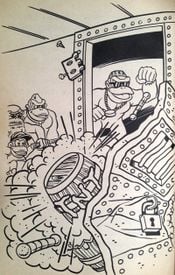
In Donkey Kong Country: Rumble in the Jungle, miniature TNT Barrels (stylized as mini-TNT Barrels) are used by Donkey Kong on several occasions throughout the novel. Before the Kongs leave their treehouse to travel to Big Ape City, Donkey Kong takes a backpack full of miniature barrels, including some that "could even explode". TNT Barrels are first used while the Kongs are battling some Kremlings and their barrel cannons in Tree Top Town. Donkey Kong launches several TNT Barrels by slinging back a tree branch, allowing the barrels to reach high above in the tree tops. Donkey Kong later uses one to break open Funky Kong's prison door within the Kremling's factory in Big Ape City, although the sound of the explosion attracts Kritter and a group of Kremlings.
Donkey Kong later uses a TNT Barrel to destroy the defense system's control room, and then again later to create a hole in the factory wall so that the Kongs are able to escape in Funky's barrel plane. While in the plane, Donkey Kong and Diddy Kong decide to jump from the plane to infiltrate King K. Rool's zeppelin. They plant the zeppelin with many time-delayed TNT Barrels, and they escape to watch it fall on top of the Kremling's factory, which causes a powerful explosion.
An illustration shows that the TNT Barrels resembles their artwork for Donkey Kong Country, although lacking a fuse at the top. And despite the novel claiming to describe "miniature" TNT Barrels, their illustrated size in proportion to the prison door appears to be closer to a regular-sized barrel.
Donkey Kong 64[edit]
TNT Barrels are hazardous objects in Donkey Kong 64. They are red and considerably smaller in size. Although hazardous, TNT Barrels have an essential role in attacking the bosses, Army Dillo and Dogadon. Kabooms from Donkey Kong Country 2: Diddy's Kong Quest – here called "TNT Bombers" – return in this game, hiding inside TNT Barrels with no fuses.
Donkey Kong Country television series[edit]
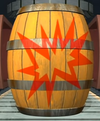
A barrel similar to TNT Barrels appears in the Donkey Kong Country animated series. Here they are referred to as Barrel Bombs or Exploding Barrels and bear a resemblance to Blast Barrels. They are seen during the first half of Booty and the Beast, where King K. Rool takes over Bluster Barrelworks and begins manufacturing exploding barrels. However, Donkey Kong chased off K. Rool and production was halted.
In Kong for a Day, K. Rool made a second attempt to seize control of the Barrel Works to manufacture more exploding barrels, but this time Donkey Kong foiled his plans before production could commence.
In Speak No Evil, Dude, it is revealed that Rool has an arsenal of exploding barrels large enough to destroy the entire island, as General Klump attempts to do just that after misinterpreting King K Rool (who was unable to communicate as he was mute from the Kongo Bongo Gone Wrongo disease).
While K. Rool possesses these barrels, he never directly uses them against the Kongs.
Super Mario-kun[edit]
A TNT Barrel appears in Super Mario-kun volume 14. During a fight with Army, Diddy Kong gives Donkey Kong a TNT Barrel. Donkey Kong then hurls it, only to have it explode on Mario and Yoshi while defeating Army. Mario then yells at Donkey Kong.
DK: Jungle Climber[edit]
TNT Barrels are objects in DK: Jungle Climber. They can destroy dense objects around them, and will explode if attacked.
Mario Golf: World Tour[edit]
TNT Barrels are obstacles in Mario Golf: World Tour. They are encountered in DK Jungle only, near Holes 3, 4, and 9. TNT Barrels lie on the ground, where they explode when a golf ball bumps into them, causing the ball to travel high up to the sky.
Mario + Rabbids Kingdom Battle[edit]
TNT Barrels appear in the Mario + Rabbids Kingdom Battle Donkey Kong Adventure DLC only. They are used to defeat the health pool and Mega Rabbid Kong during his first boss fight.
Profiles[edit]
Donkey Kong Country[edit]
- Instruction booklet description:
- English:
This drum of trinitrotoluene (that's TNT) packs quite a wallop. The explosion from these barrels can defeat almost any enemy, and break open hidden doors.[5]
- English:
- Nintendo Player's Guide: This type of barrel will explode when thrown. They are excellent for helping you locate bonus areas. If Diddy holds a TNT Drum out in front of him, sooner or later he's going to blow open a door to a bonus area. Explosion on contact![page number needed]
- Game Boy Color
- Instruction booklet description:
- English:
Throw one of these powder kegs—the resulting explosion will harm any nearby baddies.[page number needed]
- English:
- Game Boy Advance
- Instruction booklet description:
- English:
Throw one of these powder kegs and the resulting explosion will harm any nearby baddies.[page number needed]
- English:
Donkey Kong Country 2: Diddy's Kong Quest[edit]
- Instruction booklet description:
- English:
TNT Barrels explode when they are thrown. Be careful, because some Kremlings actually like to live in TNT Barrels...[page number needed]
- English:
- Nintendo Player's Guide: "This barrel is loaded with high explosive, and will go off on impact. Use it as a weapon or to break through walls."[6]
- Wii U Virtual Console manual description:
- English:
It explodes when it is thrown at an enemy or an obstacle.[page number needed]
- English:
- Game Boy Advance
- Instruction booklet description:
- English:
These, naturally, explode when thrown. Be careful, because some Kremlings actually live in TNT Barrels![page number needed]
- English:
Donkey Kong Country 3: Dixie Kong's Double Trouble![edit]
- Instruction booklet description:
- English:
TNT Barrels explode when they are thrown. The explosion from this barrel can open hidden areas.[page number needed]
- English:
- Nintendo Player's Guide: "TNT Barrels explode when you toss them against the wall. The explosion can either open a hidden part of the level or allow you to escape from a tight spot. Watch out for enemies that shoot these at you."[7]
- Game Boy Advance
- Instruction booklet description:
- English:
As you might expect, these detonate when thrown. Use the explosion as a weapon or to open hidden areas![page number needed]
- English:
Gallery[edit]
Names in other languages[edit]
| Language | Name | Meaning | Notes |
|---|---|---|---|
| Japanese | TNTバレル[?] TNT Bareru |
TNT Barrel | |
| Italian | Barile esplosivo[8] | Exploding barrel | Donkey Kong Country only |
| Barile TNT[?] | TNT barrel |
References[edit]
- ^ 1995. Donkey Kong Country 2: Diddy's Kong Quest instruction booklet. Nintendo of America (American English). Page 18.
- ^ 1996. Donkey Kong Country 3: Dixie Kong's Double Trouble! instruction booklet. Nintendo of America (American English). Page 24.
- ^ 1994. Donkey Kong Country instruction booklet. Nintendo of America (American English). Page 16.
- ^ Donkey Kong Country Nintendo Power Player's Guide. Nintendo of America (American English). Page 20.
- ^ 1994. Donkey Kong Country manual. Nintendo of America. Page 16.
- ^ Miller, Kent and Paul Shinoda (1995). Donkey Kong Country 2: Diddy's Kong Quest Nintendo Player's Guide. Nintendo of America (American English).[page number needed]
- ^ Owsen, Dan, Kent Miller, and Paul Shinoda (1996). Donkey Kong Country 3: Dixie Kong's Double Trouble Player's Guide. Nintendo of America (American English).[page number needed]
- ^ Donkey Kong Country Italian manual. Page 16.
